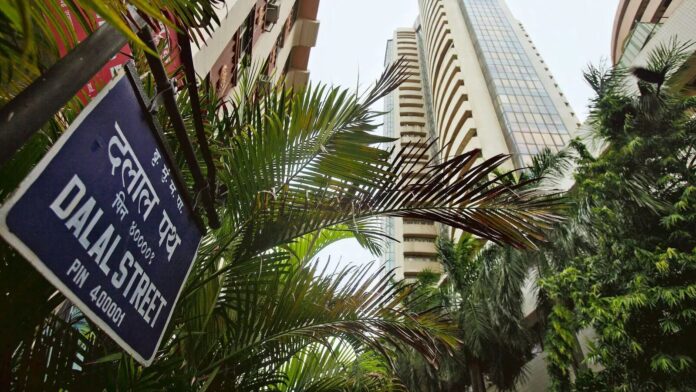Indian Stock Market Surges Amid Geopolitical Tensions: A Closer Look at Sensex and Nifty 50
On Friday, June 20, the Indian stock market benchmarks, the Sensex and Nifty 50, demonstrated remarkable resilience, registering strong gains despite escalating tensions between Israel and Iran. This unexpected surge has left investors and analysts alike pondering the underlying factors driving market sentiment amidst a backdrop of geopolitical uncertainty.
Market Performance Overview
The trading day began with the Sensex opening at 81,354.85, slightly lower than its previous close of 81,361.87. However, it quickly gained momentum, surging by 1,133 points or 1.4%, reaching an intraday high of 82,494.49. The Nifty 50 mirrored this performance, opening at 24,787.65 and climbing 1.4% to hit an intraday peak of 25,136.20. By the end of the trading session, the Sensex had advanced 1,046 points (1.29%) to close at 82,408.17, while the Nifty 50 ended 319 points (1.29%) higher at 25,112.40.
Factors Influencing Market Gains
Analysts attribute the market’s robust performance to a combination of factors. Prashanth Tapse, Senior VP (Research) at Mehta Equities Ltd, noted that the markets experienced a consolidation phase after a period of subdued trends. Strong cues from European markets and positive Dow Futures played a significant role in triggering a rally in local benchmarks. Additionally, investors engaged in short covering ahead of the upcoming monthly derivatives expiry, further bolstering market sentiment.
Despite the positive momentum, caution remains prevalent among investors due to the ongoing conflict in West Asia. A potential spike in crude oil prices resulting from escalating tensions could introduce volatility and uncertainty in the markets.
Trends in the Indian Stock Market
The Indian stock market has been in a consolidation phase for five consecutive weeks, yet it closed with healthy gains. This upward trend was supported by a revival in foreign institutional investor (FII) activity, which significantly boosted overall market sentiment. Although the week began on a subdued note, indices gained momentum in the latter half, driven primarily by strong performances in heavyweight sectors like banking and IT.
Rupak De, Senior Technical Analyst at LKP Securities, highlighted that the Nifty’s sharp upward movement after three days of consolidation indicates a resumption of its short-term rally. The index has reclaimed the 21-day Exponential Moving Average (EMA), suggesting potential for further upward movement. Support is now positioned at 24,850, with the index expected to continue advancing toward 25,350 and beyond.
Banking Sector Resilience
The Bank Nifty has shown remarkable resilience, particularly due to renewed participation from major private banking players like HDFC Bank and ICICI Bank. Ajit Mishra, SVP of Research at Religare Broking Ltd, noted that the banking index has reclaimed levels above 56,000 and could gradually advance toward 57,000 and 58,200. The 54,000–55,100 zone is anticipated to provide support in case of a pullback.
Key Triggers for the Upcoming Week
1. Israel-Iran Conflict
The Israel-Iran conflict has escalated significantly, with the United States officially joining Israel in striking Iranian nuclear facilities. Reports indicate that these strikes targeted heavily fortified sites, raising concerns of a wider regional conflict. Iran has vowed to retaliate, prompting the U.S. to initiate evacuation flights from Israel. Investors will closely monitor developments in this geopolitical landscape, as any escalation could impact global markets.
2. India-US Trade Deal
The anticipated US-India trade agreement is expected to play a crucial role in influencing the domestic market. India is optimistic about concluding the deal before the implementation of Trump’s ‘reciprocal tariffs’ scheduled for July 9, which could have significant implications for trade relations and market dynamics.
3. IPO Activity
The primary market is set to witness the opening of 17 new public issues next week, including six in the mainboard and eleven in the SME segment. Additionally, eight new listings are expected, which could attract investor interest and further stimulate market activity.
4. FII Activity
Foreign institutional investors (FIIs) maintained their buying momentum on June 20, recording a net equity purchase of ₹7,940.70 crore, marking the third highest single-day inflow of the year. This trend of positive FII inflows, which has persisted for four consecutive days, reflects a renewed interest from foreign investors in the Indian markets.
5. Crude Oil Prices
Oil prices experienced a decline on Friday following the U.S. introduction of new sanctions related to Iran, signaling a potential diplomatic resolution. Brent crude futures dropped by $1.84 (2.33%) to close at $77.01 per barrel, which could alleviate some inflationary pressures on the Indian economy.
Technical Outlook
According to Ajit Mishra of Religare Broking, the Nifty has approached the upper band of its consolidation range. A sustained move above the 25,200 level could confirm a breakout, potentially paving the way for a rally toward the 25,600–25,800 zone. On the downside, immediate support levels are identified at 24,700 and 24,400.
Conclusion
As the Indian stock market navigates through a complex landscape of geopolitical tensions and economic indicators, investors are advised to remain vigilant. The upcoming week promises to be pivotal, with key developments in the Israel-Iran conflict, trade negotiations, and market activity expected to shape the trading environment. While the recent gains are encouraging, the potential for volatility remains, underscoring the importance of informed decision-making in the current market climate.
Disclaimer: This article is for educational purposes only. The views and recommendations expressed are those of individual analysts and do not constitute financial advice. Investors should consult certified experts before making any investment decisions.

